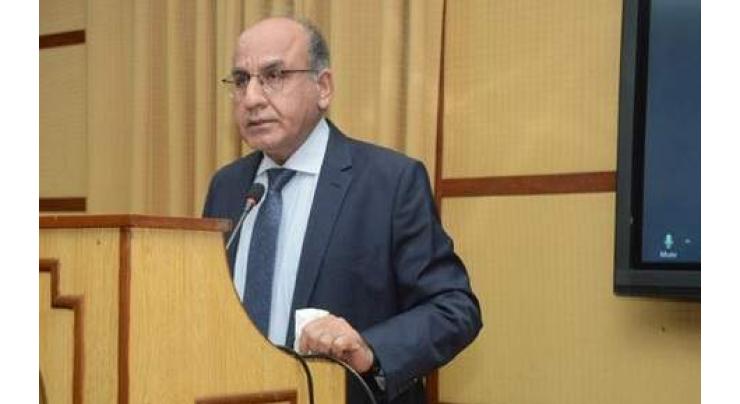
VC SMIU Urges Citizens To Play Role In Preserving Environment
Muhammad Irfan Published June 10, 2022 | 07:27 PM

Vice Chancellor Sindh Madressatul Islam University, Prof. Dr Mujeebuddin Sahrai Memon stressed on role of every individual in preserving the environment and said that environmental crisis like climate change, pollution, and water shortage had put the Earth in danger zone
KARACHI, (UrduPoint / Pakistan Point News - 10th Jun, 2022 ) :Vice Chancellor Sindh Madressatul islam University, Prof. Dr Mujeebuddin Sahrai Memon stressed on role of every individual in preserving the environment and said that environmental crisis like climate change, pollution, and water shortage had put the Earth in danger zone.
Prof Sahrai, while addressing a seminar held on Friday, in connection with the 'World Environmental Day', said that "Disasters come in seconds but recovering from the destruction takes years. Therefore, before meeting the disaster we must try to handle the issues seriously and consciously".
The seminar was organised by Department of Environmental Sciences and ORIC of Sindh Madressatul Islam University here.
Dr Sahrai said Pakistan was blessed with affluent solar and hydal resources, four seasons, major crops, plains, river, sea and mountains but those precious natural resources were not being properly utilised for development of the country.
The VC said the youth accounted for more than 50 percent of the total population of the country, and they needed to be engaged for the betterment of the country. Younger generation should come forward and play their significant role in spreading awareness among masses including farmers about environmental issues, he urged.
In Sindh, Karachi city was the most affected by climate change, Dr Sahrai noted and advised the Department of Environment of SMIU to form a waste management system in the campus to keep the university clean and green.
Water resources management specialist Muhammad Umer Karim gave presentation on historical mapping of groundwater in Sindh by M.H Panhwer, and Lower Indus Development Plan 1966 and spoke on the environmental issues of the province.
About 80 to 85 percent under ground water had been saline, while further reckless use of underground water will create geological problems as well, he noted and suggested to refrain from over exploitation of underground water.
He was of the view that floods and rains used to recharge a thin layer of aquifer, which used to be consumed throughout the year through hand pumps or dug wells but contiguous irrigation system raised the cropping intensities as well as ground water tables.
Karim further said the intensification of crops and enhanced use of artificial fertilisers and pesticides had contaminated the resource base and now water from any source could not be directly used for drinking purpose.
In Sindh, river flow was decreasing due to increased usage of underground water through tube wells, he said and argued that natural flow of a river firstly maintains the underground water level.
Though Sindh was producing good crops, the rise in cash crops dried up Indus River, he observed and said that before the colonial era, there was a centuries-old natural irrigation system in the province, which was environment-friendly.
"River Indus is our lifeline, and our environmental system is badly affected due to shortage of water", he said and added that ground water availability in Sindh must be maintained up to 8 to 10-million-acre foot.
Jibran Khalid Kidwai, an environmentalist and social development consultant, emphasised the need of promoting environmental education, and renew and expand commitments to protect the province, country and planet at large.
There were very serious environmental issues including deforestation, urban and rural flooding, desertification and degradation of fresh water bodies but Sindh will be the leading province to launch first ever cleaner production policy by Sindh Environmental Protection Agency, he said.
Recent Stories

Punjab CM inaugurates Pakistan’s first Virtual Women Police Station

Dutch model Donny Roelvink embraces Islam

Experts raise concerns over introduction of 10-stick packs

Iranian president arrives in Karachi

Law Minister expresses Govt's resolve to address issue of missing persons

Rizwan’s batting order may be changed: Sources

Nawaz Sharif to visit Guangzhou exhibition in China

FM Dar not traveling to China: Foreign Office

PM takes notice of deliberate delay in tax cases

Iranian President visits Allama Iqbal’s mausoleum

Iranian President arrives in Lahore today

Currency Rate In Pakistan - Dollar, Euro, Pound, Riyal Rates On 23 April 2024
More Stories From Pakistan
-
KP CM chairs meeting of Integrated Security Architecture’s apex committee
35 minutes ago -
President Raisi accorded warm welcome on arrival in Karachi
44 minutes ago -
Spending quality time in nature may lower heart disease, diabetes risk: Study
45 minutes ago -
President Raisi pays respects at Quaid's mausoleum
55 minutes ago -
FM Dar speaks to overseas Pakistanis via Zoom
55 minutes ago -
Govt to form parliamentary committee to end violence in Balochistan: CM Bugti
1 hour ago
-
LESCO collects over Rs 4.48m from 104 defaulters in 24 hours
1 hour ago -
Dr. Jamileh calls for role of Muslim women for promotion of Islamic culture
1 hour ago -
LESCO detects 73,722 power pilferers in 217 days
2 hours ago -
Farmers express concerns on low wheat price in market
2 hours ago -
CEO SEPCO for taking action against those involve in over billing & power theft
2 hours ago -
Iranian Envoy calls on Sindh Governor
2 hours ago